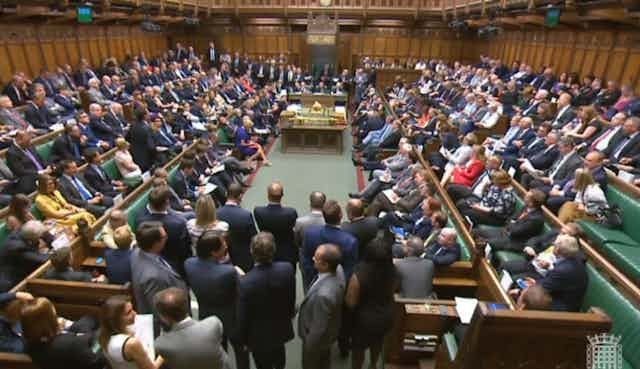The Conservative party’s chief whip, Julian Smith, has come under increasing pressure to resign over the way MPs voted during a key piece of Brexit legislation on July 17. The scandal centres on a vital piece of the parliamentary voting process, known as “pairing”. But what is it, and why does it matter?
Voting is part and parcel of any MP’s life in parliament. The House of Commons and the House of Lords make decisions through votes on almost every day that they sit.
Sometimes the speaker will ask the house to vote by voice and call for MPs to shout “aye” or “no”. If the result is unclear or the decision is an important one, MPs will cast their vote in person by walking through one of two voting lobbies behind the speaker’s chair – the “aye” lobby or the “no” lobby – where they are physically counted by parliamentary clerks who record the list of MPs voting each way.
All of the larger political parties in the Commons appoint a whip (or a team of whips) whose role is to organise their party’s arrangements for voting. This means ensuring that all of their party’s MPs vote – and that they understand which way the party wishes them to vote. Their job is of supreme importance on key votes and those where MPs strongly oppose the party line on a vote – as is the case with Brexit. Where the government has a small majority in the Commons, it becomes crucial for the whips to understand who will vote be voting in which division lobby.
Paired up
But there are times when MPs are unable to vote. They may be unwell, in hospital or on parliamentary visits overseas. They may also be on maternity or paternity leave. One such MP is Jo Swinson, a Liberal Democrat MP whose baby son is just a few weeks old. On such occasion, whips from the governing and opposition parties often make arrangements between themselves to make sure that such absences do not cause the government to win a vote that they would otherwise lose (or vice versa).
An MP will be paired with another MP from an opposing party and both will agree not to vote in a division, or series of divisions. It is an informal arrangement which rests on trust between MPs and party whips. As such, Hansard (the record of parliamentary proceedings) doesn’t record which MPs are paired, but if you cannot see your MP’s name on the division lists for a particular list it may explain their absence.
This week has seen a series of divisions on the Trade Bill which sets out the key details of the UK’s trade policy following withdrawal from the European Union. During the votes on the bill, Swinson was paired with Conservative MP Brandon Lewis. This meant that we wouldn’t expect either MP to have cast a vote in the division lobbies.
But when the key votes took place on July 17, it seemed that after abstaining for the first few divisions, Lewis did cast some votes on key amendments. Swinson tweeted a record of the votes, writing that the pairing agreement had been broken. The following day the leader of the house, Andrea Leadsom, stated that this had been an honest mistake, but The Times later revealed that other MPs had also been encouraged to break pairing arrangements.
Calls for proxy voting
We may never know for sure whether this was a genuine mistake or a strategic calculation to ensure the government survived the votes in the Commons. And although the government won the votes on the Trade Bill where Lewis voted with only a tiny majority of six, this one vote alone did not swing it for them.

All this gives succour to those MPs campaigning for proxy voting in the commons for colleagues who are taking maternity, paternity or adoption leave. As the political scientist Sarah Childs outlined in her 2016 Good Parliament report, there are precedents for this type of arrangement in other legislatures.
The House of Commons voted in favour of moving towards a proxy system for “baby leave” in February 2018 and the Commons Procedure Committee held an inquiry into proxy voting. Their report, published in May, noted that current pairing arrangements were “inadequate for new parents” and recommended that the commons trial a non-compulsory proxy voting system.
MPs were due to debate the issue again in early July, but was cancelled due to lack of time. Scottish National Party MP David Linden held up a scan of his unborn child as he protested the lack of time to debate the arrangements. The commons is due to debate the issue further in September, after the summer recess. Given the timing of this week’s pairing failure there will be even more pressure on the government to agree to such a trial of proxy voting.

